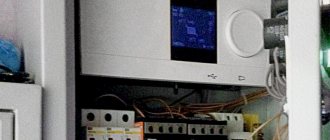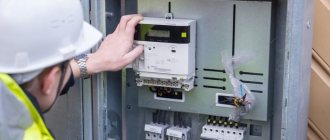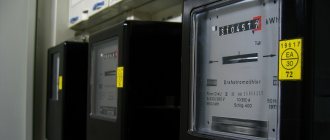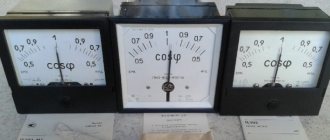The procedure for installing common house utility meters in apartment buildings. What do you need to know?
Summary:
1. The procedure for installing common house utility meters in apartment buildings.
In accordance with Part 1 of Art. 157 of the Housing Code of the Russian Federation, the amount of payment for utility services is calculated based on the volume of consumed utility services, determined by the readings of metering devices, and in their absence, based on the standards for the consumption of utility services approved by government authorities of the constituent entities of the Russian Federation in the manner established by the Government of the Russian Federation.
In an apartment building (hereinafter - MKD), the following metering devices are subject to installation: individual and common (collective) meters. A collective (community) metering device (hereinafter referred to as GMU) is a measuring instrument (a set of measuring instruments and additional equipment) installed in an apartment building if technically possible and used to determine the volume (quantity) of the communal resource supplied to the apartment building
(paragraph 8, clause 2 of the Rules for the provision of utility services to owners and users of premises in apartment buildings and residential buildings, approved by Decree of the Government of the Russian Federation of May 6, 2011 No. 354 (hereinafter referred to as the Rules for the provision of utility services).
Ensuring the installation and commissioning of control units for cold and hot water, thermal and electrical energy, natural gas, as well as their proper operation (inspections, maintenance, verification, etc.) is included in the maintenance of common property in the MKD (clause “to » clause 11 of the Rules for the maintenance of common property, approved by Decree of the Government of the Russian Federation of August 13, 2006 No. 491 (hereinafter referred to as the Rules for the maintenance of common property)) and is ensured by the management organization.
As follows from the content of clause 38 (1) of the Rules for the maintenance of common property, payment for the installation of fire control facilities is carried out by the owners of premises in an apartment building on the basis of an invoice
in and in the amount specified in paragraph. 2 clause 38 (1), except for cases when such expenses were taken into account as part of the payment for the maintenance of residential premises (and (or) as part of the mandatory payments established for members of a homeowners’ association or a housing cooperative or other specialized consumer cooperative and (or ) contributions related to the payment of expenses for maintenance, current and major repairs of common property). Citizens - owners of premises in an apartment building pay invoices in accordance with Part 12 of Art. 13 of the Law on Energy Saving. Similar explanations are provided in the Letter of the Ministry of Construction of Russia dated 04/09/2014 No. 5792-MS/04 “On payment of expenses for the installation of collective (common house) metering devices.”
Management organizations act in these relations as specialized commercial organizations that manage apartment buildings as their main business activity. By virtue of paragraphs. “c” clause 31 of the Rules for the Provision of Utilities, the contractor is obliged to ensure the installation and commissioning of the control center, with the exception of cases where utility services are provided to consumers by a resource supplying organization.
Ensuring the installation and commissioning of collective (common house) metering devices for cold and hot water, thermal and electrical energy, natural gas, as well as their proper operation (inspections, maintenance, testing of metering devices) is the responsibility of the management organization by virtue of the provisions of Part. 2 tbsp. 162 of the Housing Code of the Russian Federation and paragraphs. “k” clause 11 of the Rules for the maintenance of common property.
As part of the management of an apartment building in accordance with GOST R 56038 and the provision of utility services, the contractor provides, among other things: installation and commissioning of common house metering devices, individual, common (apartment) or room metering devices in accordance with GOST 8.156, Rules for the provision of utility services . The accuracy class of a common house metering device must correspond to the accuracy class of metering devices installed in premises owned by the owners, and vice versa
(Clause 7.2 GOST R 51617-2014 “National Standard of the Russian Federation. Housing and communal services and management of apartment buildings. Utilities. General requirements”, approved by Order of Rosstandart dated June 11, 2014 No. 544-st).
The installation location of a common house metering device determines the limit of operational responsibility of the parties to the resource supply agreement
, unless otherwise established by agreement with the owners of the premises (clause 8 of the Rules for the maintenance of common property). In this case, the external boundary of the networks that are part of the common property is the external boundary of the wall of the apartment building, unless otherwise provided by the legislation of the Russian Federation.
Metering devices should be installed in accordance with their technical data sheet. The technical passport contains the requirements for the installation and operation of the metering device.
The general procedure for installing communal metering devices in a residential building includes
(clauses 41, 52 of the Rules for commercial metering of thermal energy, coolant, approved by Decree of the Government of the Russian Federation dated November 18, 2013 No. 1034, clause 5.4 GOST R 56534-2015, clause 5.13 GOST R 56501-2015, clause 5.5 GOST R 56536-2015, clause 5.11 GOST R 56533-2015):
1) inspection of the installation site of the metering device;
2) obtaining technical specifications for the design of a metering unit (from a resource supply organization);
3) development of design and estimate documentation for the metering unit (by a specialized design organization);
4) coordination of design documentation for the metering unit with the resource supplying organization;
5) completing the metering unit in accordance with the design documentation;
6) installation of a metering device (insertion into existing networks), commissioning (trial operation);
7) commissioning, installation of seals, delivery of the installed metering device for commercial accounting to the resource supplying organization.
Operation and replacement of control unit (E
We especially emphasize that the operation of the control center is not an urgent task that could not be foreseen when planning the contract price. Therefore, the rule formulated in Resolution of the Presidium of the Supreme Arbitration Court of the Russian Federation No. 6464/10 on additional payment for emergency work and services performed and provided*(4) does not apply to them. Thus, from a financial point of view, it is inappropriate for the management company to carry out activities for the operation of the control center not provided for in the management contract and not included in its price without bringing the issue to the general meeting of premises owners, because it is unlikely that it will be possible to recover the actual expenses incurred from consumers.
This is interesting: Can Bailiffs Take Land If It Is the Debtor’s Only Property
At the same time, the responsibility of the management company to carry out the necessary minimum of measures for the maintenance of common property corresponds to its right to demand proportionate payment. The procedure for setting the price of foreseeable work was described in detail in the article by S.N. Kozyreva “Mandatory and additional measures for the maintenance of common property: features of financing of management companies” (N 12, 2013). In short, the management company may initiate a review of the fee due to an increase in the volume of services and work under the contract upon expiration of the current contract. If the owners of the premises do not meet it halfway, the management company has the right not to renew the management agreement after its expiration, since an essential condition of the agreement should be considered not agreed upon. How do these conclusions apply to the financing of activities for the operation of public facilities?
Installation of control unit using old contributions for major repairs
Article 170 of the RF Housing Code provides for two possible options for forming a capital repair fund: on the account of a regional operator and a special account. In this case, the capital repair fund is formed on the account of the regional operator.
The presence of debt of individual owners of premises to the management company (for payment of housing and communal services) also does not relieve the manager from performing mandatory work on the common property of the house. In accordance with Part 2 of Art. 162 of the Housing Code of the Russian Federation, the role of the customer under the MKD management agreement is the plurality of all owners of premises in the house (both observing and violating payment discipline). Due to the specifics of the subject of the agreement (performance of work (provision of services) for the maintenance of common property in the apartment building), the manager is deprived of the opportunity to make counter-provisions to only those owners who comply with payment discipline. In addition, we remind you that the conduct of claims and lawsuits against persons who have not fulfilled the obligation to pay for residential premises and utilities is one of the mandatory elements of the activity of managing apartment buildings (see Rules for carrying out activities for managing apartment buildings [2]) . Thus, work with the debts of the population is also included in the responsibilities of the management company; the success of its implementation does not affect the overall structure of the legal and contractual obligations of the management company for the proper maintenance of common property within the framework of the execution of the management agreement.
17 Jul 2020 lawurist7 284
Share this post
- Related Posts
- Young Family How Much Subsidy Is Paid?
- Low-Income Family What Payments Are Available in the Tver Region
- Apartment Under Seizure by Bailiffs What to Do
- Should a Person Drive by Power of Attorney in Someone Else’s Car If He Has a Debt to the Bailiff?
Specifics of installation and maintenance
Conflict situations are not always caused by a lack of understanding among the residents of the house, which is why the law on energy conservation included a clause on the installation of communal meters. Disputes often flare up due to the fact that citizens cannot understand who should pay for the installation of an electricity meter at home. Although the answer to this question lies on the surface. According to the Rules for the maintenance of common property of apartment buildings, all expenses are borne by the owners of residential premises. They draw up an agreement with the management company, which is then responsible for maintenance. However, citizens are charged not only for utilities, which are consumed directly within the apartment. They pay for electricity, gas, and water, which are spent on the needs of common property.
Read also: Free legal advice on housing and communal services
Consequently, the communal electricity meter is purchased from the same fund into which the residents of the apartment building contribute money every month. The only thing is that management companies charge funds using different algorithms. Alternatively, a representative of the organization can initiate a house-wide meeting at which he will declare the need to install a metering device for the entire house. There he also informs you what expenses accompany such a procedure.
It is possible to use funds from the money that comes in monthly. Subsequently, additional costs will be reimbursed on an installment basis at the expense of residents of the apartment complex. But all the hassle of purchasing, installing and maintaining the meter falls on the management company.
Another question may arise from residents of the house who faithfully pay all fees, including payment for the “current repairs” item. Is it possible to receive funds from this fund to purchase common household meters? Russian legislation clearly states that current repairs must be carried out according to a clear plan in order to avoid emergency situations. The state of engineering systems is usually such that in most cases it is impossible to manage with minimal measures. As a result, funds from this fund must first be spent for their intended purpose, and only if there is a surplus can they be spent on the purchase of meters.







